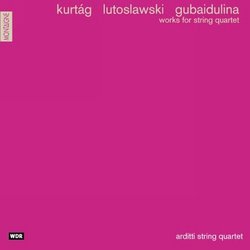| All Artists: Witold Lutoslawski, Sofia Gubaidulina, Arditti String Quartet Title: Works for String Quartet Members Wishing: 2 Total Copies: 0 Label: Disques Montaigne Release Date: 9/11/2001 Album Type: Original recording reissued Genre: Classical Styles: Chamber Music, Historical Periods, Classical (c.1770-1830) Number of Discs: 1 SwapaCD Credits: 1 UPC: 713746245627 |
Search - Witold Lutoslawski, Sofia Gubaidulina, Arditti String Quartet :: Works for String Quartet
 | Witold Lutoslawski, Sofia Gubaidulina, Arditti String Quartet Works for String Quartet Genre: Classical
|
Larger Image |
CD Details |
CD ReviewsArditti Quartet's Kurtag (plus Lutoslawski & Gubaidulina) R. Hutchinson | a world ruled by fossil fuels and fossil minds | 04/20/2002 (5 out of 5 stars) "The Arditti Quartet here performs all three of Kurtag's string quartets, along with Lutoslawski's one quartet, and Gubaidulina's second as well. It adds up to 70 minutes of music, and if it was a vinyl LP, it would fit perfectly, with 35 minutes of Kurtag on Side 1, and 35 minutes of Lutoslawski (25") and Gubaidulina (10") on Side 2. Recorded in 1990, the disc has now been reissued in Montaigne's eco-friendly cardboard packaging.
What distinguishes Arditti's Kurtag from the Keller Quartet on ECM? (see my review) The AQ takes the tempos slightly faster. Not too fast, in fact I'd say if anything the KQ has slowed them down for dramatic effect. The tempo difference is likely one chief cause of the difference in affect -- the AQ sounds more anguished overall, whereas the KQ is slightly more restrained, more stoic. Of course the KQ is treated to Manfred Eicher's patented production, with its noticeable resonance, and this produces a darker tone, it seems. The Montaigne production of the AQ is more natural, with a clean, clear surface. The KQ adds three short Kurtag pieces for an all-Kurtag set, whereas the AQ adds the long Lutoslawski and shorter Gubaidulina quartets. The KQ comes in a gorgeous ECM package. Kurtag's quartets are some of the finest of the 20th century, clearly fusing Webern and Bartok. Lutoslawski's quartet is one of his more radical works, though I don't think he's at his best at his most radical. The Alban Berg Quartet's recording is better, emphasizing the continuity from the classical tradition (see my review of the EMI Lutoslawski disc with the ABQ quartet). I haven't yet heard the Kronos recording, so I can't compare. Kronos has recorded at least two of Gubaidulina's quartets (one on SHORT STORIES and one on NIGHT PRAYERS -- see my reviews of both). Kronos seems more inclined to record Eastern European quartets than Arditti overall -- hopefully they will follow their Schnittke cycle with a Gubaidulina cycle some day soon." |

 Track Listings (22) - Disc #1
Track Listings (22) - Disc #1